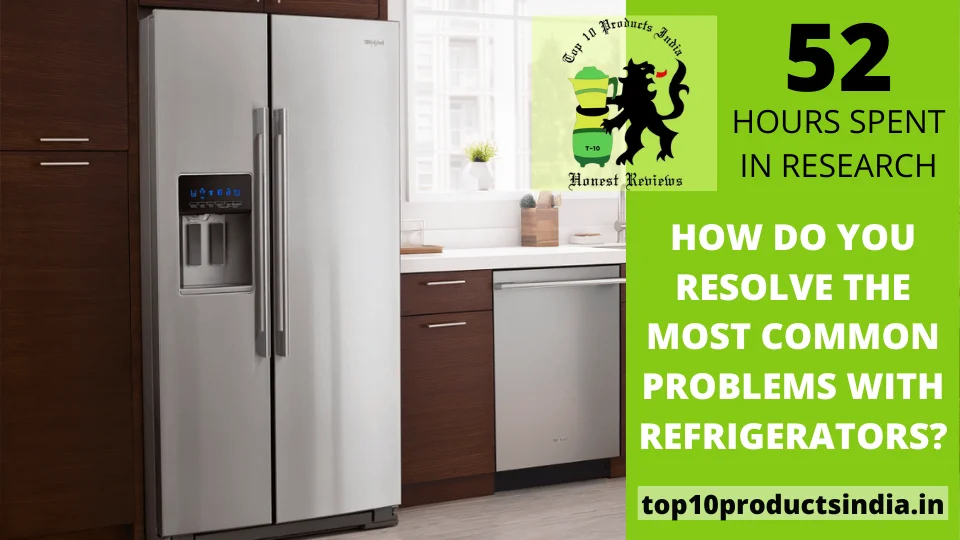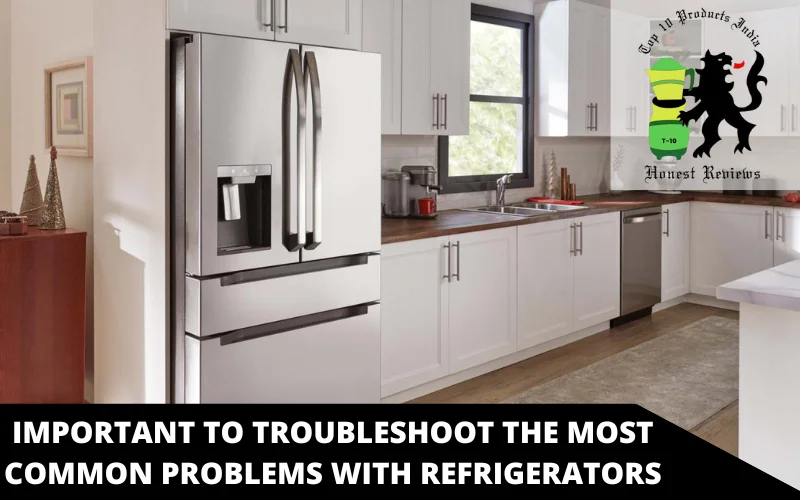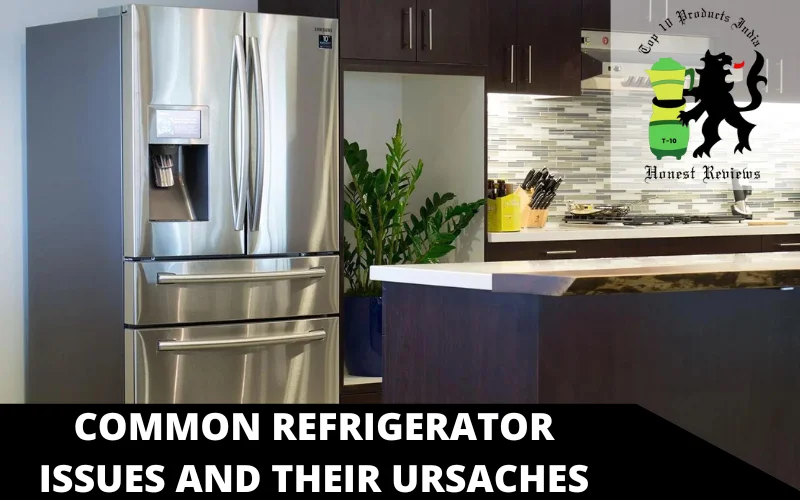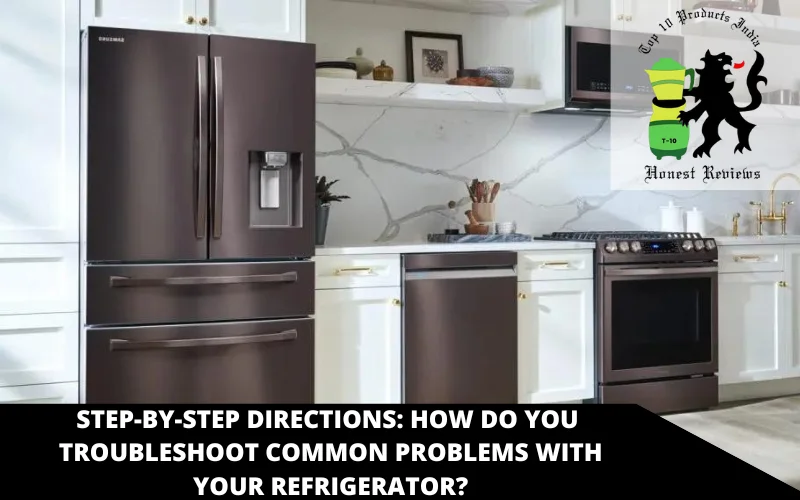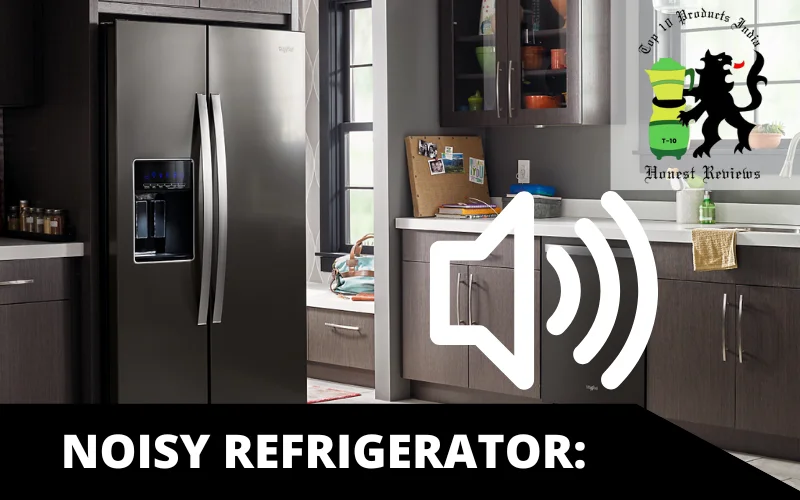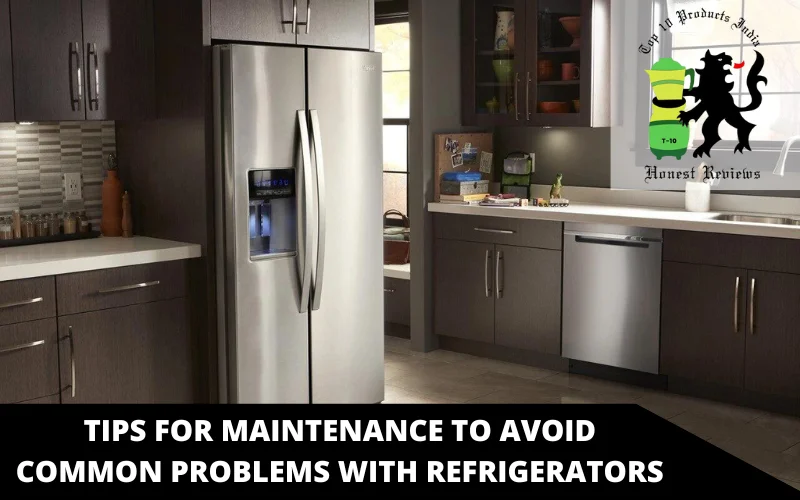Finding the root of common refrigerator issues isn’t difficult. If you follow the guidelines in this post to identify and resolve some of the most frequent problems people encounter. Be sure to put safety first when you’re working with your refrigerator. Don’t hesitate to contact an expert if you’re uneasy with a specific repair.
Furthermore, routine maintenance will go a long way in preventing these issues from occurring in the initial place. Make sure to keep your refrigerator clean, examine the temperature settings, and look for wear and tear indications.
If you pay good attention to your fridge and swiftly fix any issues, you will ensure that it will continue to help you as well as your loved ones throughout the years that are the future. We hope this guide will also help you, as we wish you the best of luck with your efforts to troubleshoot your refrigerator!
The importance of a functioning refrigerator
A refrigerator is essential in every modern house since it helps keep food healthy and fresh. It helps preserve perishable goods such as vegetables, fruits, meats, dairy products, dairy products and leftovers, allowing us to store them over longer periods and without the risk of losing quality. A well-functioning fridge is useful and essential for our well-being and health.
If we didn’t have a functioning refrigerator and a refrigerator that works, we’d have to go shopping for food more frequently, which means wasting both time and cash. Additionally, food spoilage could cause sickness, food poisoning or even hospitalization.
So, having a functioning refrigerator is vital to our daily life and overall health. Regular maintenance and prompt resolution of any problems are crucial to ensure that your refrigerator is in good condition and that your food remains fresh and secure.
Important to troubleshoot the most common problems with refrigerators
Finding the root of common refrigerator issues is crucial for many reasons. It can first aid in saving money by avoiding hiring a repair professional. A few simple troubleshooting techniques easily solve most refrigerator issues, and you could save substantial cash by learning to fix the problem yourself.
A second reason is that prompt troubleshooting will stop minor problems from developing into bigger ones. For instance, a minor water leak in the refrigerator’s line could seem like a minor issue; however, if it is not addressed, it could damage your home’s water supply and cause more expensive repairs.
Thirdly, identifying common problems with your refrigerator will prevent food waste and spoilage. If your refrigerator isn’t working properly, it might not keep your food at the right temperature, causing the food to be spoiled and wasted. By identifying and fixing the problem, you can ensure that your food remains fresh and secure.
Common Refrigerator Issues and Their Ursaches
Common issues with refrigerators include:
- Warm refrigerators: A warm frig is often due to a myriad of reasons, like a malfunctioning thermostat, broken compressor, or blocked air vents.
- Leaks are another issue caused by a damaged water supply line could cause, as can a blocked defrost drain or a damaged door gasket.
- Noisy refrigerator: A loud refrigerator may be due to many issues, including the fan’s motor being worn out or a malfunctioning compressor or a damaged fan blade.
- Ice buildup could result from an inoperative defrost system, a blocked drain for the defrost, or a damaged gasket for the door.
The root cause of every problem
- The refrigerator is warm. A malfunctioning thermostat may not allow the refrigerator to cool appropriately; the compressor could have trouble circulating refrigerant and blocked air vents could block the circulation through cold, fresh air.
- Lessening: Damaged or faulty water supply line could cause water to spill onto the floor. A blocked drain for defrosting can result in water overflowing in the freezer, and a damaged door gasket could let warm air in, which can cause leakage and condensation.
- Noisey fridge: A damaged or worn-out fan motor could cause the sound of a buzzing or humming, or a malfunctioning compressor may generate a loud banging and clicking sound. Additionally, a damaged fan blade could cause an erupting or scraping sound.
- It is possible that the defrost unit may not melt ice in the manner it is supposed to, or a blocked defrost drain could cause water to freeze. Additionally, a damaged gasket for the door can let warm air in the door, which can cause condensation and ice to build up.
Expert’s Word
Knowing the most common issues and their root causes will be your first move towards solving the issue with your refrigerator. Once you have identified the issue and determined the cause, you can make the necessary changes to resolve the issue and prevent it from occurring repeatedly.
Step-by-step directions: How do you troubleshoot common problems with your refrigerator?
Warm refrigerator:
If your refrigerator isn’t at the temperature it should be, or the food gets spoiled fast, it could indicate a warmer refrigerator. Many factors, such as the dirty condition of your coils and a malfunctioning thermostat or an inoperable compressor, could cause this problem. There are a few troubleshooting tips to resolve the problem:
- Make sure the temperature settings are correct. Verify that the temperature settings are correct. The ideal temperature for refrigerators is 35-38degF. The temperature of your freezer should be between 0 and 5 degrees. If the temperatures exceed the recommended levels, lower the settings accordingly.
- Cleaning the coils is essential. Dirty or dirty coils could hinder fridges from cooling effectively. Unplug the refrigerator, then place the coils on the bottom or at the back of the appliance. Clean them using a vacuum or brush to remove dirt or dust.
- Examine the door gaskets. The damaged door gaskets could allow warm air to be drawn into the refrigerator, which can affect the ability to cool. Check the gaskets to replace them if they are broken or damaged.
- Check the thermostat. If temperatures and coils are in good order, there could be an issue with the thermostat. Test the thermostat using a multimeter. The continuity of the thermostat. If it’s not working, you can replace it.
Leaks:
Leaks in your refrigerator can cause anxiety, cause damage to the walls and floors, and cause mould growth. Leaks can result from various factors, such as the defrost drain becoming blocked or a defective pipe for the water supply or damaging the valve that supplies water to your refrigerator. Here are some steps to troubleshoot:
- Examine the drain for defrost A blocked defrost drain could cause water to build up and leak out of the refrigerator. Find the drain in the rear of the freezer and scrub it with pipe cleaners or a turkey baster using hot water. Repeat the procedure to ensure that the drain stays clean.
- Examine the line that supplies water. If your refrigerator is equipped with an in-built water dispenser or ice maker, the problem could be in the supply line for water. Check the line for damage or kinks, then replace it when needed.
- Inspect the valve that supplies water. If the line for the water supply is working fine, the issue could be related to the valve for the water inlet. Check the valve for leaks or damages, and replace it if necessary.
- Get rid of the drip tray. The drip pan located at the lower part of the refrigerator may also leak if it’s filthy or blocked. Take the pan off and wash it thoroughly with water and soap.
Noisy refrigerator:
If your refrigerator makes loud sounds, several possible causes could be worth a look. Begin by checking the fan motor in the freezer or the refrigerator’s rear. A damaged fan motor could make a loud sound, and you may be able to check the fan blades to see any damages or obstructions. If the motor for the fan is damaged, it will need replacement.
A condenser fan that is blocked could also create an ear-splitting noise. Find the fan in the back of your fridge and clean it with a vacuum or brush. You can swap your fan for a brand-new one if it has been damaged.
Another reason for a squeaky refrigerator could be an unresponsive compressor. Check the compressor for leaks or damage and repair it if needed. A noisy compressor could be a sign of a serious issue that needs to be addressed immediately.
Also, you should examine the level of the refrigerator’s level. Unlevelled units can cause undesirable noise. Use a spirit level to ensure your refrigerator is level, and then adjust the levelling legs according to the noise. Fix the problem by identifying the cause and then enjoy a peaceful refrigerator.
Ice buildup:
Ice build-up in freezers is a typical problem in refrigerators, decreasing the effectiveness of cooling and causing food to spoil. Many factors can cause ice buildups, such as a defective thermostat for defrosting, a blocked defrost drain or a damaged door seal.
To determine the cause of ice accumulation in your refrigerator, There are several possible causes to look into. Start by looking at the thermostat for defrost that regulates the freezer’s temperature and assists in helping to prevent the accumulation of ice. A defective thermostat can stop the defrost cycle from triggering and causing ice to build up. Use a multimeter to check the thermostat to determine if it functions properly.
Another possible cause is the defrost heater which melts any ice buildup in the defrost cycle. If the heater isn’t working properly, it will not be able to melt the ice and cause it to build up. Also, use an instrument to test for continuity and replace the heater as needed.
A blocked defrost drain could also lead to ice building within the freezer. Find the drain at the back of the freezer, and use a pipe cleaner or Turkey baster filled with boiling water to remove any obstructions. Repeat the procedure till the drainage is clean.
Also, examine the seal on the door for cracks or damage. If the seal is damaged, warm air can get into the freezer and accumulate ice. Check the seal thoroughly and replace it when needed. By following these steps, you can solve any issues with ice build-up within your refrigerator.
What can be done to pinpoint the root of the issue?
- Be aware of any unusual sounds emanating from the refrigerator.
- Verify the temperature of the freezer and refrigerator.
- Check for signs of condensation or leaks.
- Inspect the condenser coils for dirt or other debris.
- Check the gasket of the door for wear or damage.
Solutions to address each issue
- Set the thermostat to your desired setting, and replace it when needed.
- Clean condenser coils as well as air vents
- Repair or replace damaged components
- Clear any blockages in the drain for defrosting.
- Repair any damaged or worn-out gaskets on the doors.
Tips for Maintenance to Avoid common problems with refrigerators
Routine maintenance is essential to prevent common problems with refrigerators
Preventing common problems with refrigerators is much simpler to fix than fixing the problem. Here are a few routine maintenance tasks to keep your refrigerator operating efficiently:
- Make sure to clean the condenser coils at least once per year to ensure adequate cooling.
- Examine the door’s gasket for wear and tear or wear and then replace the gasket if needed.
- Maintain the freezer and refrigerator at the proper temperature to avoid the loss of food and energy, as well as reduce energy consumption.
- Replace and check the water filter when necessary.
- Make sure to clean the drain frequently to avoid clogging.
How do you keep your fridge neat and well-maintained?
Maintaining your refrigerator’s cleanliness is an essential element of routine maintenance. Here are some suggestions to keep your refrigerator tidy and well-maintained
- Wipe the interior of the freezer and refrigerator using mild detergent.
- Clean up leaks and spills promptly to avoid stains and smells.
- Get rid of expired or spoiled food items regularly to avoid mould and bacteria growth.
- Maintain the exterior of the refrigerator spotless and free of dust.
- Do not overfill the refrigerator or freezer since this could impede the cooling and circulation of air.
Expert’s Word
If you perform regular maintenance and maintain your refrigerator’s cleanliness, You can avoid many typical refrigerator issues and prolong the life span of your appliances. Be sure to adhere to the manufacturer’s instructions regarding maintenance and cleaning for the best results.
FAQs
Why is my refrigerator not cooling?
There are various reasons for this problem, such as an inefficient compressor, dirty condenser coils, or an unresponsive thermostat. Check the condenser coils for dirt and clean them up if they’re filthy. It is possible to contact a repair technician if this isn’t working.
What is the reason my refrigerator is making strange sounds?
Different issues, like the motor of a fan that is not working properly, blades for the evaporator, broken parts, and damaged compressors, can produce strange sounds. Look for the cause of the noise and contact us to make repairs if you need.
Why is water coming out of my refrigerator?
It could be because of the defrost drain getting blocked or a damaged pipeline for the water. Examine the drain to see any blockages, and clear it out if required. If the problem continues, contacting a professional for assistance is possible.
Why does my refrigerator run all the time?
It could be a problem with the thermostat or control system. Try changing the temperature settings to try to see if it can help. If it doesn’t, you might require replacing the thermostat or getting expert assistance.
What is the reason my refrigerator has a bad smell?
A food spill and the growth of moulds can cause unpleasant odours to your fridge. Remove any spills as soon as they occur, and clean your fridge regularly using baking soda to ensure it stays fresh.
What is the reason for the buildup of frost inside my fridge?
A: The buildup of frost can result when warm air gets into the freezer through cracks within your door’s seal. It can also happen when there’s a problem in the defrost mechanism, like a defective timing motor or defrost heater. Look for holes inside the door seal, replace it if required, or request repairs on the defrost system’s components.
Conclusion
A functioning refrigerator is essential to keep food healthy and safe for consumption. However, typical refrigerator issues, including a warm refrigerator leak, noisy operation, and accumulation of ice, can happen if you follow the step-by-step directions to troubleshoot and identify the causes of these problems and fix the problem yourself or contact an expert if you need.
In addition, regular maintenance tasks such as clearing the condenser’s coils, inspecting the door’s gasket and keeping the fridge clear of dirt can avoid common issues. If you take good maintenance of the refrigerator, you will ensure its durability and ensure your food remains healthy and fresh for consumption.

